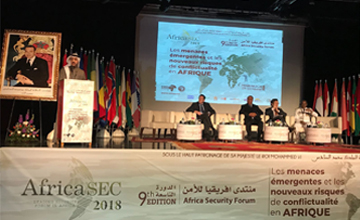ID :
480479
Sun, 02/11/2018 - 01:00
Auther :
Shortlink :
https://www.oananews.org//node/480479
The shortlink copeid
Security challenges in Gulf region spotlighted

Rabat, Feb. 10 (BNA): Board of Trustees Chairman of Bahrain Centre for Strategic, International and Energy Studies (DERASAT) Dr. Shaikh Abdullah bin Ahmed Al Khalifa stressed that Iran’s dominance and expansion project, Qatar’s subversive role and its interference in countries’ internal affairs, surging terrorism, threatening international navigation and energy security and the repercussions of the economic modernisation plans are main security challenges facing the Arabian Gulf region which represents a vital part of the Middle East and the world.
Speaking in the opening of the 9th edition of Marrakesh Security Forum, which is organised by the Moroccan Centre for Strategic Studies in partnership with the African Federation for Strategic Studies on February 9 and 10, Dr. Shaikh Abdullah stressed political, security, economic and social challenges in the Middle East and the threat they pose to stability and growth. He added that the Arabian Gulf, due to its strategic location and vital importance is witnessing quality changes. He also emphasised that Iran’s expansionist project since 1979, which is led by the Governance of the Jurist (Wilayat Al-Faqih), the first supporter of radical religious fundamentalism, contravenes all international laws and covenants.
Dr. Shaikh Abdullah explained that Iran is carrying out a clear programme to infiltrate countries which is known as the “new generation wars”, driven by a dream to revive the bygone Persian empire. He pointed out Iran’s large-scale operations to export the revolution within the so called “Iranian Space” by forming and funding terrorist militias, equipping them with weapons and using oriented media.
On the other hand, Dr. Shaikh Abdullah spotlighted Qatar’s subversive role in the Middle East, pointing out that the Qatari stances since 1995 have shown a constant and systematic targeting of many GCC and Arab countries after Doha has established itself as one of the tools of anarchy and division in the region and dedicated its financial and media for this purpose. He noted that the Kingdom of Bahrain, the Kingdom of Saudi Arabia and the UAE have given a lot of opportunities to the Qatari regime to stop its hostile practices. However, it failed to meet all obligations in Riyadh Agreement of 2013 as well as the complementary agreement and its executive mechanisms of 2014 and continued to support and fund the terrorist groups, providing them with a secure refuge and unleashed a discourse of provocation and hatred in the mass media.
Dr. Shaikh Abdullah warned of the threat of terrorism with the rising danger of radical groups and terrorist organisations, the extremist ideology and the culture of religious violence. He also underlined the danger of cyber terrorism as a non-traditional threat, pointing out that in the first semester of 2016 the Bahraini public institutions were subject to around 3000 cyber attacks, an average of 500 attacks every month. Iran was behind most of those attacks, he noted, pointing out steps taken by the moderate GCC countries, led by the Kingdom of Saudi Arabia, to promote regional security and deter dangers, including mainly setting up the Arab Coalition to Support Legitimacy in Yemen and the Islamic Military Counter-terrorism Alliance.
Dr. Shaikh Abdullah said after a few days Bahrain will celebrate on February 14 the 17th anniversary of the National Action Charter which was approved by an overwhelming majority of the Bahraini people and is considered as a milestone in Bahrain’s history as a comprehensive national project spearheaded by His Majesty King Hamad bin Isa Al Khalifa to achieve the aspirations of the Bahraini people.





